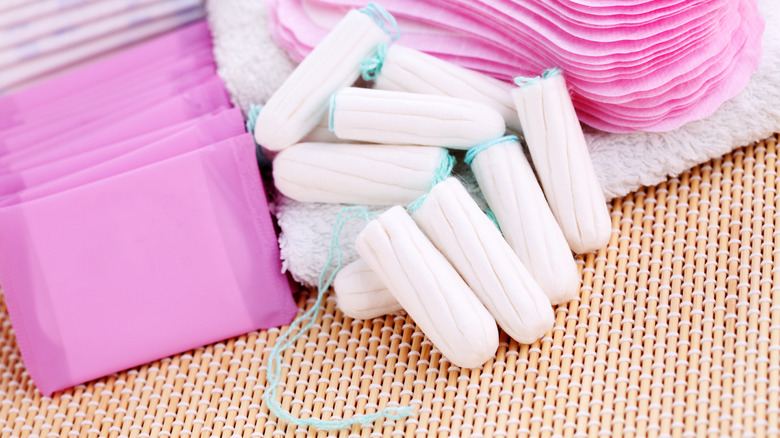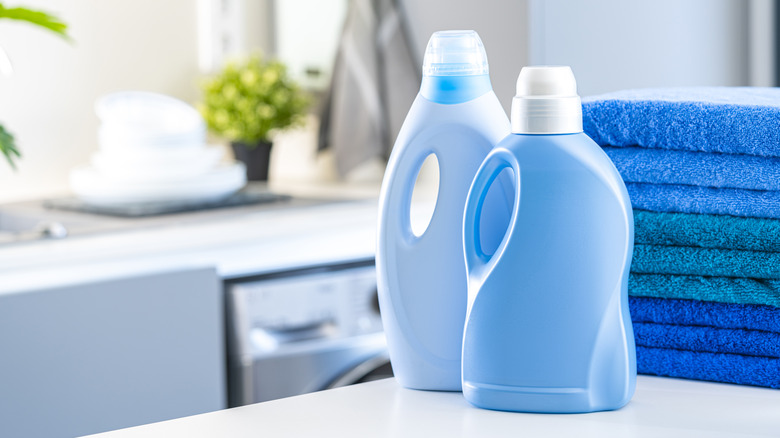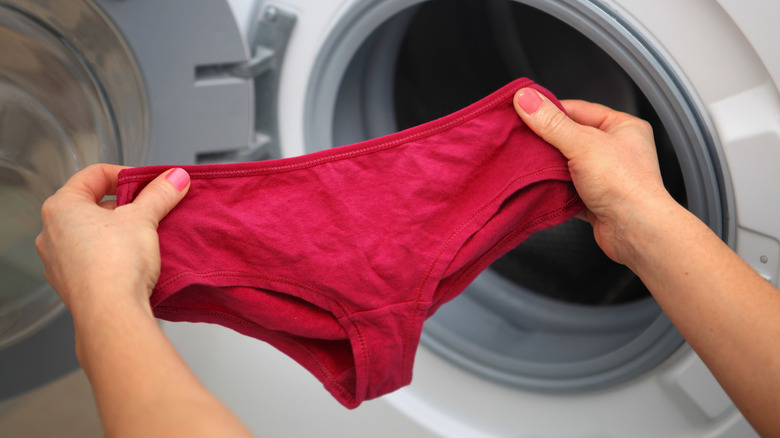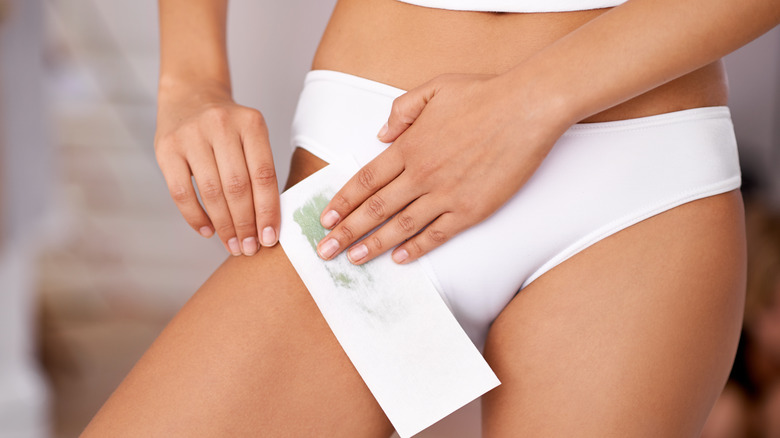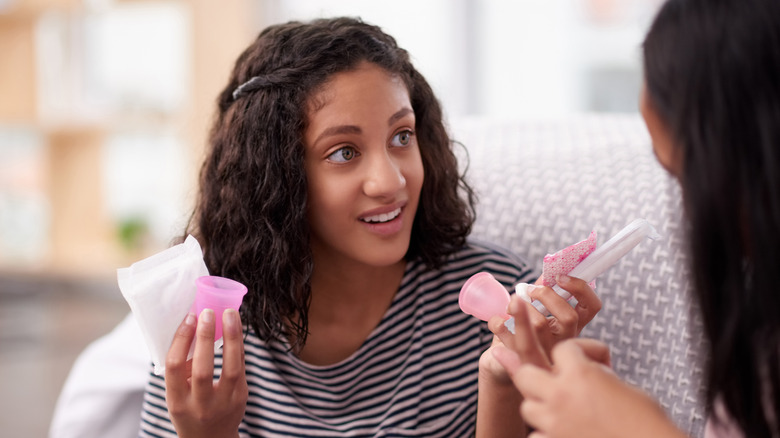Common Causes Of Vaginal Allergies (Yep, It's A Thing) And How To Treat Them
When you first feel a burning sensation down there, your initial thought might be that it's a UTI or an STI. While those are both reasonable suspicions, sometimes, your issues have nothing to do with an infection. In fact, there are many vaginal allergies that can cause similar sensations. While both allergic reactions, like contact dermatitis, and STIs can lead to itching, burning, redness, swelling, or pain, STIs are more likely to be accompanied by lesions, bumps, or open sores, while allergic reactions are more likely to be limited to things like redness and general discomfort, according to Healthline.
From sperm to a bikini wax, many seemingly harmless things can spur an allergic reaction in your vagina, or vulva, which is the outer or external part of your vagina. The tissue of your vagina, which is a mucous membrane, can be really sensitive, so even small changes could cause irritation and leave you feeling less than comfortable. So, before you begin chugging cranberry juice or contacting former partners, take a moment to look into some of the causes of vaginal allergies and how they could be causing vaginal irritation.
Condoms
A condom can be a common cause of allergies, especially for those who already have reactions to certain foods like avocados, bananas, and kiwis. If after (or during) intercourse, you start to feel symptoms like swelling, redness, and a rash in the vaginal area, it could be a sign you're allergic to latex. Depending on how severe your reaction is, you could develop symptoms elsewhere, too. Be careful, as hives, sneezing, watery eyes, and trouble breathing are all potential symptoms of a latex allergy, per Web MD.
Of course, safe sex still deserves to be a priority for preventing STIs and avoiding unplanned pregnancy. The good news is there are plenty of latex-free options. For many, lambskin is one of the best condom options because it is totally hypoallergenic. Polyisoprene condoms, which are a type of synthetic rubber, are another option, as are polyurethane condoms, which are made from a type of plastic.
Semen
Even though it might seem strange, it is totally possible to be allergic to semen. This is caused by a sensitivity to a protein within the semen. Per Cleveland Clinic, the allergy affects an estimated 40,000 people in the U.S. Some may notice this allergy immediately the first time they have sex with someone who has a penis, while others may not experience it until much later on. It's also possible to have a reaction to one partner's sperm and not another's, or you may begin having a reaction to a long-time partner's sperm unexpectedly.
Symptoms of semen or seminal fluid allergy may start immediately, or show up within 30 minutes of exposure. Common symptoms are redness, pain, itching, swelling, and burning in the vagina or vulva. However, some may experience these symptoms in the mouth or on the skin, too, especially if it occurs after oral sex. You can have localized symptoms, or more serious symptoms, which are called systemic symptoms and can show up as hives and trouble breathing. The biggest clue that you're dealing with a sperm allergy and not something else, is that you only experience these symptoms with unprotected sex, according to ISSM. One of the easiest ways to avoid potential reactions is to use condoms.
Douching
Douching, a process where one cleans the vagina by washing it internally might seem like a super hygienic way to keep the vagina clean and healthy. The reality is that it's generally not recommended because it can throw off the natural balance of good and bad bacteria in the vagina. Beyond that, though, it can also cause vaginal allergies. Sings of a bad reaction to douching include irritation and dryness around the vagina, per Office on Women's Health. This is mainly because of the chemicals in store-bought douches. Some douches that spray may also contain propellants that can harm the vagina, especially if there are already abrasions in the area from shaving.
While some may think that an at-home douche made of something natural like vinegar and water is a better option, the truth is any kind of douching can cause problems and throw the vagina's ecosystem off balance. To clean the vagina effectively, the best thing to do is to let it clean itself, as that is what vaginas are naturally designed to do. If you're concerned about hygiene, washing the outside of the vulva and labia with a mild soap is the best option to keep it clean while avoiding irritation.
Scented Products
If you feel self-conscious about period odor, you may think that scented products are the answer. While there are companies that have helped perpetuate the myth that it's necessary to cover up natural scents with chemicals, scented feminine hygiene products are increasingly going by the wayside. This is partly because some of their chemicals are connected to cancer, reproductive issues, and allergic reactions. Scented products like tampons, pads, and even toilet paper can all cause irritation to the inside and outside of the vagina. If you use these products and notice itching and irritation, swelling, burning, or a rash, it could be a hint you're allergic and need to stop right away.
In most cases, symptoms should subside within a day or two of discontinuing use. If they don't, you could be dealing with a more serious reaction, and will want to see a doctor ASAP. If you're still concerned about odor, or you're dealing with an odor that you think is unusual, it could be a sign of a yeast infection, bacterial vaginosis, or an STI, in which case visiting your gynecologist may be a good idea, according to Cleveland Clinic.
Laundry Detergent
Like scented period products, some detergents may contain chemicals that irritate the vagina and the skin around it. Emulsifiers, dyes, parabens, and preservatives are common detergent ingredients that can cause allergic reactions. This is also true of fabric softeners and dryer sheets. These products are sometimes referred to as contact irritants since they can cause inflammation when they come into contact with the skin of your vulva, which is sometimes referred to as contact dermatitis. Common symptoms are itching, burning, and rashes.
Some other symptoms you may experience are a feeling of rawness, pain with the insertion of an object into the vagina, and a moist, damp feeling that occurs because of weeping on the surface of irritated skin. University of Iowa Hospital points out it can be easy to confuse this with general vaginal discharge, so take note of any moisture that appears or feels different from your norm. While you might notice the most changes when switching to a new detergent, it can also occur with a detergent you've used for a long time. To avoid the this, opt for a natural or hypoallergenic detergent, especially for cleaning you underwear.
Dirty underwear and tight clothing
Sometimes, it might not be the detergent your clothes are washed in that is causing vaginal allergies, but the clothes themselves causing problems. While vaginal discharge is normal and healthy, a build-up of moisture around your vagina creates a potential breeding ground for bacteria, which can lead to infections or physical symptoms like irritation and itching, similar to an allergic reaction. Beyond that, underwear fabric can also create its own host of problems. Synthetic materials like polyester can trap bacteria and sweat, which can mean more irritation and chafing in addition to bacteria.
Too-tight clothing can also be an issue, especially pants or jeans (if you need another reason to say goodbye to skinny jeans, this could be a good one). If you wear clothes that put pressure on your groin or that rub against the skin creating friction, it could lead to chafing in addition to trapping bacteria. Not only could this potentially increase the likelihood of developing infections, it can also lead to allergy-like symptoms such as skin irritation on the vulva. To avoid this opt for clothing that is looser, and natural fabrics like cotton that allow the vagina more room to breathe.
Waxing
For some, getting their bikini line waxed helps them feel smooth, clean, and ready for swimsuit season. For others, it unfortunately means pain and irritation. If you get waxed and experience redness, burning, and pain, think twice before booking that next appointment. Because waxing involves ripping out hairs around the groin, it's easy for hair follicles to become infected. This is called folliculitis and results in red, oozing bumps that are painful and itchy. That's not the only cause of an allergic reaction related to waxing, though. Hair can prevent rubbing and chafing, so removing it could cause your skin to become irritated. Some chemicals in the wax itself could be to blame, too, and may cause contact dermatitis or even trigger eczema.
Folliculitis should go away on its own, although it may be beneficial to contact a doctor if it doesn't start to show signs of improvement. Contact dermatitis can also go away by itself, although over-the-counter creams and ointments can help. Soaking the area in cool water may help soothe some irritation, and wearing loose clothing can help, too, according to Health. And above all, always make sure you're booking your wax appointment with a reputable, trusted professional to ensure cleanliness.
Unfamiliar objects
Although rare, it is definitely possible to have a silicone allergy that causes one to react to a menstrual cup or sex toy. If you notice persistent pain or a rash down there after using, that's a sign to stop imediately. But even if you aren't allregic,using menstrual cup that's too large for your vagina can still cause irritation to the vaginal wall. Additionally, insertion can cause friction, which can be irritating. A menstrual cup that's left in too long can also start to breed bacteria, which could result in redness and irritation, or worse lead to yeast infections and bacterial vaginosis, per Metropartners OBGYN.
Along with menstrual cups, anything inserted into the vagina that hasn't been cleaned first (like sex toys, or a finger) could potentially lead to irritation, a reaction, or infection if they are carrying bacteria. PIV sex can also cause feelings of discomfort in your vulva and vagina, too. Vigorous sex can irritate the vulva because it creates friction. It can also cause vaginal irritation if there isn't enough lubrication. Allergies to some types of lube are possible, as well. Ensuring that anything entering your vagina is clean may go a long way toward preventing allergic reactions and infections.
Tips for managing vaginal irritation
Any kind of vaginal or valvular irritation can be super annoying to deal with. The upside is that there are ways not just to manage it but to prevent it. One of the best things you can do is immediately stop using or doing anything you suspect is the cause of your irritation. To soothe vaginal irritation, trying an over-the-counter antihistamine or anti-itch cream can be a good place to start. If you'd rather go a more natural route, oatmeal baths can be super soothing, as can using coconut oil on the affected area.
Generally, your vagina will heal itself once you remove the irritant, so your focus should be on supporting it while it does its thing. A good way to do this is to wear loose-fitting clothing for better air circulation. The more fresh air, the less trapped contaminants. Cotton underwear allows for moisture absorption and breathability, and going commando when possible can be helpful, too. Avoiding anything with harsh chemicals is also ideal, and remembering that your vagina is self-cleaning is important. The most cleaning you'll need is mild soap on the outside of your vagina. For many issues, a little patience can go a long way. However, if you don't notice any improvement in your symptoms, talking to your doctor to figure out if something more serious is going on should be your next move.




